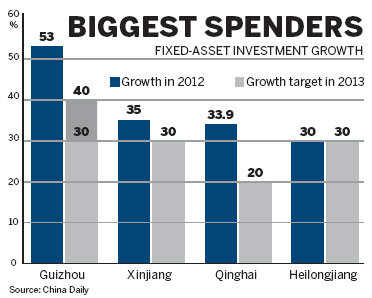Debt alert for local authorities
Updated: 2013-02-05 07:44
By Zheng Yangpeng (China Daily)
|
||||||||

Reliance on infrastructure may lead to overexposure, experts say
Plans announced by local governments to invest heavily in fixed assets this year have ignited a chorus of debt warnings from experts.
A total of 19 provincial-level regions, out of 31 on the mainland, have set fixed-asset investment growth targets above 20 percent. Most of them are in central and western regions.
In 2012, fixed-asset investment, or money spent on infrastructure, factories and public facilities, far exceeded 20 percent over the year in 11 provincial-level regions.
The national average was 20.6 percent.
Experts said overspending on fixed assets may lead to mounting local debt and risk lenders being overexposed.
"In other countries, debt-fueled investment has historically led to a banking or foreign exchange crisis," said Tom Byrne, senior vice-president of Moody's credit office for Asia and Middle East.
"The latter is not a concern for China because investment is predominantly financed by domestic savings. But the former could be, even though the banking system is currently stable.
"Most East Asian economies are highly sensitive to changes in the rate of investment in China - South Korea in particular," Byrne said.
"In addition, commodity exporters such as Chile, Saudi Arabia and Australia are also fairly dependent on investment in China."
China's local debt is expected to have grown to 13 trillion yuan ($2.1 trillion), or 25 percent of its GDP, according to Haitong Securities.
Local government income growth has been slowing due to cooling property markets.
Local governments are banned from selling bonds directly so they turn to banks, or financing vehicles, set up by local governments, to provide funding.
Over-reliance on investment will also deter the transition toward a consumption-led economy, experts said.
He Keng, vice-chairman of the financial and economic committee of the National People's Congress, the top legislature, said "the scale of investment should be decided by the scale of demand".
"It is wrong to require a growth rate and an investment to GDP ratio. The mindset that the government should ramp up investment when economic growth is weak should be abandoned," He said.
The National Development and Reform Commission approved a raft of major projects last year, mainly in infrastructure.
GDP growth in the third quarter dipped to 7.4 percent, the weakest since the first quarter of 2009.
But the commission's measures evoked widespread concern that China was resorting to heavy investment to bail out the economy.
Critics said these investments, dominated by government agencies, often bring a low return and the last massive stimulus plan, during the 2008-09 financial crisis, caused the current overcapacity.
Nie Riming, a researcher with the Shanghai Institute of Finance and Law, said interest rates, not the size of the investment, are the real problem.
If they are set too low, local governments will be emboldened to borrow without considering the potential return.
Li Lihui, president of the Bank of China, suggested the country should make employment the major target.
He said attention should be paid to job creation not only during the construction period of the investment, but also during the operation phase, after the investment is concluded.
But there are supporters of using fixed-asset investment as an economic booster.
In the annual session of the Guangdong Provincial Committee of the Chinese People's Political Consultative Conference, that concluded last week, some members said investment is critical to the province's growth.
Xu Shaohua, deputy governor of Guangdong province, said the government would encourage the private sector to boost investment.
Li Wenfang in Guangzhou contributed to this story.
zhengyangpeng@chinadaily.com.cn
(China Daily 02/05/2013 page1)

 In Photos: 7.0-magnitude quake hits Sichuan
In Photos: 7.0-magnitude quake hits Sichuan
 Li Na on Time cover, makes influential 100 list
Li Na on Time cover, makes influential 100 list
 FBI releases photos of 2 Boston bombings suspects
FBI releases photos of 2 Boston bombings suspects
 World's wackiest hairstyles
World's wackiest hairstyles
 Sandstorms strike Northwest China
Sandstorms strike Northwest China
 Never-seen photos of Madonna on display
Never-seen photos of Madonna on display
 H7N9 outbreak linked to waterfowl migration
H7N9 outbreak linked to waterfowl migration
 Dozens feared dead in Texas plant blast
Dozens feared dead in Texas plant blast
Most Viewed
Editor's Picks

|

|

|

|

|

|
Today's Top News
Live report: 7.0-magnitude quake hits Sichuan, heavy casualties feared
Boston suspect cornered on boat
Cross-talk artist helps to spread the word
'Green' awareness levels drop in Beijing
Palace Museum spruces up
First couple on Time's list of most influential
H7N9 flu transmission studied
Trading channels 'need to broaden'
US Weekly

|

|







